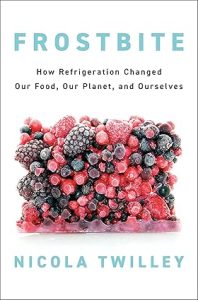Date: 25 August 2024
Location: Jay & Gina
We had a pretty good turnout. In fact, I believe all of the regulars were there except for Claudia, who was gallivanting somewhere around the world. After the usual visiting with appetizers and drinks, we got started on the discussion of the book. Although most had read some of the book, and indicated they planned to finish it, there were only three of us who finished the book. It was then a little strange that we had an extended discussion of the subject of the book, the cooling of food to help slow the rotting of it, which begins at the time it is harvested. There was talk of ice boxes and fridges, how fresh vegetables used to be available, and how different things are now as opposed to the way they were when we were very young, due to the “cold chain”.
Gina had set out table service inside and outside and some of us enjoyed eating out in the pleasant weather.
There were a number of statements that grabbed my attention. Some of them were:
The solution of Jihyun Ryou to the problem of the preservation of food: “a set of ingenious wall-mounted and counter-top units that draw on traditional, pre-refrigeration food storage techniques. Fruits, vegetables, and eggs – all would be freed from our monolithic fridges and instead distributed in a series of carefully tailored environmental niches around the kitchen. After all, beer and ice cream need to be cold, but produce doesn’t. It just has to be preserved.”
“… about an hour before an egg is laid, … a hen’s shell gland squirts on a protective coating made of protein, lipids, phosphorus, and more… which chicken people call either “the bloom” or “the cuticle”… In the US … egg producers wash freshly laid eggs in soap and hot water … which removes the protective cuticle, so the egg has to be refrigerated. In the rest of the world, where the cuticle is left intact … eggs are sold unrefrigerated, in cartons stacked alongside such shelf-stable foods as sugar and flour.”
A freshness-testing device for eggs – a glass of water. If the egg sinks it is good, if it floats, it is not.
“ … fresh produce spoils because it respires oxygen and loses water …” “ In the lab, Apeel has begun to see evidence that it will be able to quadruple shelf life – at which point it will have effectively matched refrigeration’s powers to slow produce decay. In other words, we’d get the same result from a coating made from food waster that requires very little energy for it one-time application as from the entire power-hungry and labor-intensive system we’ve built to keep our food cold.”
“Few people are even aware that their salad bag is a high-tech respiratory apparatus.”
I encourage those who have not finished reading the book to do so. I think you will enjoy it.
— Reynolds
